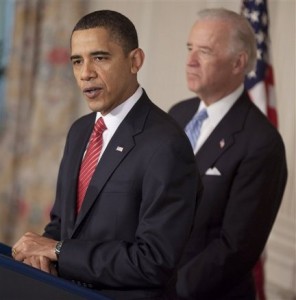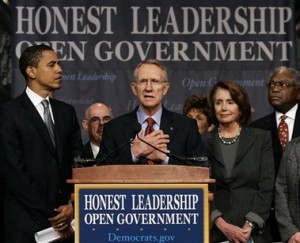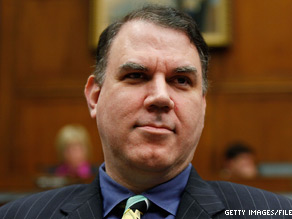
President Obama cannot like the new ABC/WaPo Poll that shows Obamacare remains unpopular and about 2/3 of Americans do not believe his health care talking points
In a final debunking of the spurious Gallup poll being used by the White House and establishment media to “prove” that Americans turned on a dime to now “support” Obamacare, ABC News and the Washington Post put out a new poll this morning which unequivocally evidences that Americans remain opposed to Obamacare:
In the days since President Obama signed the farthest-reaching piece of social welfare legislation in four decades, overall public opinion has changed little, with continuing broad public skepticism about the effects of the new law and more than a quarter of Americans seeing neither side as making a good-faith effort to cooperate on the issue.
Overall, 46 percent of those polled said they support the changes in the new law; 50 percent oppose them. That is virtually identical to the pre-vote split on the proposals and similar to the divide that has existed since last summer, when the country became sharply polarized over the president’s most ambitious domestic initiative.
The health-care debate galvanized the country to a remarkable extent. About a quarter of all adults say they tried to contact their elected representatives in Congress about health care in recent months, including nearly half of those who say they are “angry” about the changes. In general, opponents of the measure were more than twice as likely as supporters to say they had made the effort.
The ABC News/Washington Post poll found a full 50% of Americans oppose the Democratic health care reform package, while an astounding 40% of Americans “strongly oppose” Obamacare, which matches the all-time high found by this poll in “strong” opposition. The only change since the passage of the bill is a bit of a rally effect of Democrats, with strong support for Obamacare rising to 32%:
8. On another subject: overall, given what you know about them, would you say you support or oppose the changes to the health care system that have been enacted by (Congress) and (the Obama administration)? Do you feel that way strongly or somewhat?
……………….——– Support ——– ——— Oppose ——– No
………..NET Strongly Somewhat ……..NET Somewhat Strongly ……opinion
3/26/10 46 32 13 50 10 40 4
2/8/10* 46 22 25 49 11 38 5
1/15/10 44 22 22 51 12 39 5
*2/8/10 and prior: “proposed changes…that are being developed by”
This polling will finally put to rest the untoward and fraudulent efforts of the Obama Administration and establishment media to use the outlier, one-day Gallup poll showing Americans approve of Obamacare by a 49%-40% margin as it will be difficult to credibly claim that one-day poll, which stands alone showing a major bounce in approval for Obamacare post-passage, is at all realistic. Another interesting tidbit from this morning’s poll is that Americans are more likely to vote for a Congressperson who opposes Obamacare than one who supports Obamacare by 6%-8% margin:
24. Say a candidate for Congress voted FOR the changes to the health care system recently enacted by (Congress) and (the Obama administration). Would that make you more likely to [support] that candidate for Congress, more likely to [oppose] that candidate, or wouldn’t it make much difference in your vote? (IF SUPPORT/OPPOSE) Are you much more likely to support/oppose that candidate or somewhat more?
………………..—- Support —- —- Oppose —– No No
…………………..NET Much Smwt NET Smwt Much diff. opinion
3/26/10 26 16 9 32 6 27 40 2
3/26/10 RV 27 17 9 35 5 29 36 2
1/15/10* 22 12 10 31 7 24 45 2
11/15/09 25 13 12 29 8 20 45 1
Separately, the poll is slightly skewed regarding party ID, showing the Democrats with a 10 point partisan ID edge, which is probably at least a few points over reality, and the largest gap reported by this poll since November, showing the GOP at just 24%, which is somewhat counter-intuitive as the GOP has gained steam in recent months by riding the public’s opposition to health care reform.
Nonetheless, even with that skew, this ABC News/Washington Post poll conclusively proves that the “conventional wisdom” of Democrats and the establishment media that Obamacare would magically transform into popular legislation upon passage was and is completely false. Even the left-leaning WaPo’s writeup on the poll admits that opponents are much more intense than supporters.
Despite the best efforts of the establishment media and Democrats to smear the tea party as racists, extremists and terrorists, Americans view the tea party positively (41%-39%), an improvement from February 2010 (35%-40%) according to this poll.
It would be interesting to know what the partisan leanings of the 20% with “no opinion” on the tea party now are, to determine if the tea party has room to continue to grow in favorability or is reaching its peak.
Finally, this polling also conclusively proves that Americans believe President Obama is lying about the Obamacare legislation every time he speaks of it, with large majorities believing Obamacare will weaken Medicare (not strengthen it), increase the deficit (not “historically” reduce it), worsen the quality of care (not improve it) and finally that many will lose their present plan or doctor (not “if you like your plan, you can keep it”):
More people see the changes as making things worse, rather than better, for the country’s health-care system, for the quality of their care and, among the insured, for their coverage. Majorities in the new poll also see the changes as resulting in higher costs for themselves and for the country.
Most respondents said reform will require everyone to make changes, whether they want to or not; only about a third said they believe the Democrats’ contention that people who have coverage will be able to keep it without alterations. And nearly two-thirds see the changes as increasing the federal budget deficit, with few thinking the deficit will shrink as a result. The Congressional Budget Office said the measure will reduce the deficit.
About half of all poll respondents said the plan creates “too much government involvement” in the health-care system, a concern that is especially pronounced among Republicans.
Senior citizens, who typically make up about one in five midterm voters, represent a particularly valuable but tough audience on this issue. More than six in 10 of those 65 or older see a weaker Medicare system as a result of the changes to the health-care system. Overall, seniors tilt heavily against the changes, with 58 percent opposed and strong opponents outnumbering strong supporters by a 2-to-1 ratio.
All told, it is clear from this ABC News/Washington Post poll, and all other post-Obamacare passage polls other than the spurious one-day Gallup poll hyped by the White House and media, that Americans simply aren’t buying what President Obama and the Democrats are selling regarding their massive new comprehensive health care reform plan. It will be interesting to see if these poll results change the “conventional wisdom” in Washington that continues to linger in the establishment media that Obamacare is somehow transformed into a popular piece of legislation because of its passage.
UPDATE: Ed at Hotair notes the depressing news for Democrats from this poll, even with the partisan ID skew, and the overwhelmingly negative ratings Obama receives on his next big focus: immigration.
With the WaPo survey oversampling by at least five points and perhaps as much as seven, it’s not too surprising to see Obama get a 53/43 approval rating in this poll. It should dismay Democrats to see ObamaCare still losing ground even after the Post had to amp up the partisan gap four extra points from the last survey. The other issue approval ratings won’t be much comfort, either:
* Health care – underwater, 48/49
* Economy – seriously underwater, 45/52, with 40% strongly disapproving
* Budget deficit – 43/52Interestingly, Obama’s worst issue by far is immigration. Only 33% approve of his handling of immigration issues, while 43% disapprove, 28% strongly so. Obama has expressed interest in taking on immigration with the ObamaCare fight mainly over, but these numbers suggest that he may want to wait until after the midterm elections.




